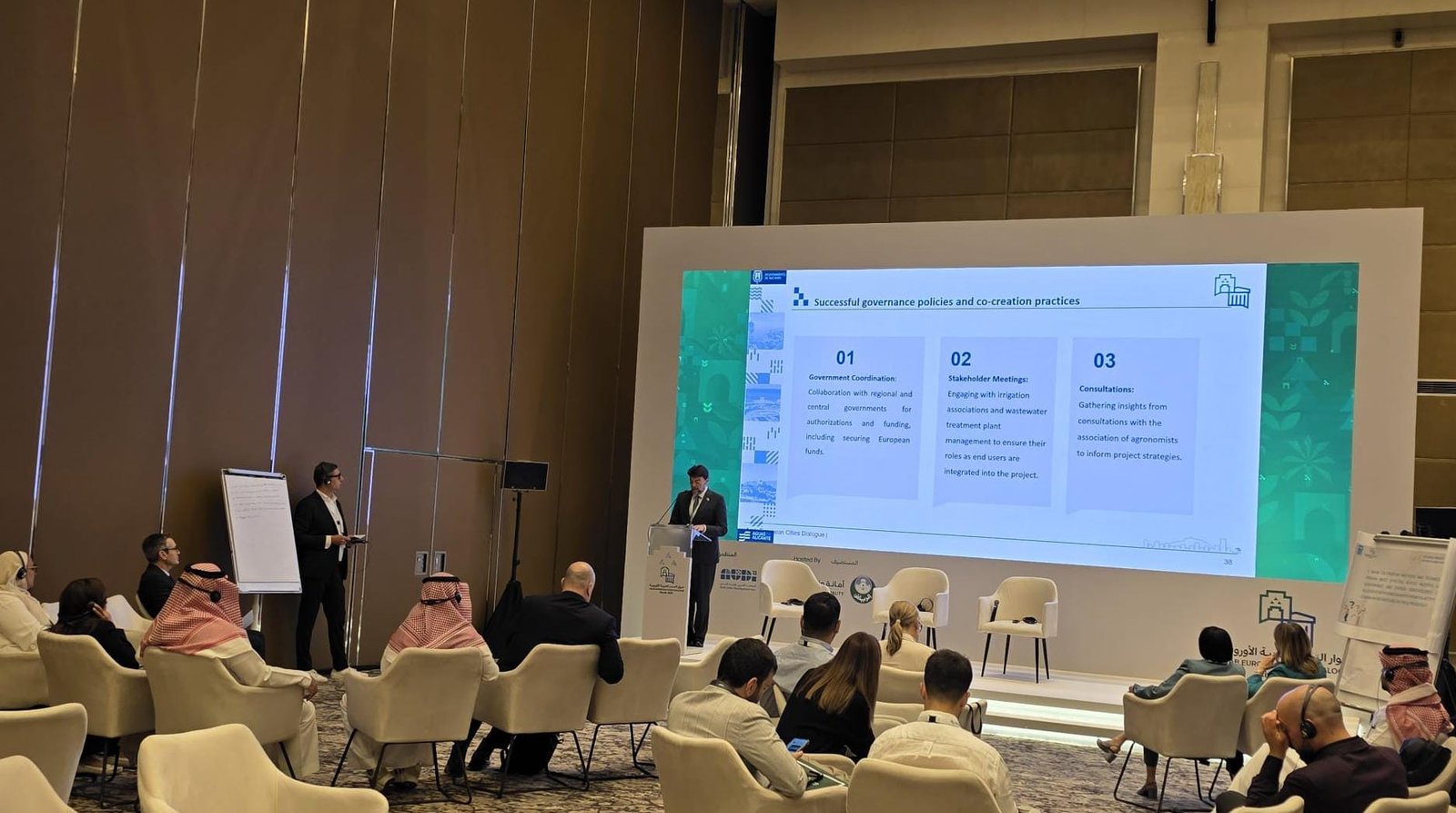The City Council and Aguas de Alicante have installed more than 200,000 smart meters to minimize resource loss, while 87% of public parks are irrigated with reclaimed water.
“Our network operates with 88% efficiency thanks to smart metering, pressure management, active leak control, and data modeling driven by artificial intelligence,” explained the mayor.
Alicante, May 13, 2025. The mayor of Alicante, Luis Barcala, intervened on Tuesday in Riyadh at the closing session of the Arab-European Cities Dialogue Forum (AECD 2025) with the presentation of the municipal strategy ‘Alicante Agua Circular’ for the maximum utilization of water resources. The strategy has been recognized by the Saudi summit organization as «an example of effective and successful governance, which has generated positive results in improving citizen participation and local development.» The mayor used Arabic at the beginning and end of his speech, receiving applause from the attendees, as well as English and Spanish in the middle of his presentation.
During the presentation, Barcala emphasized that this «innovative» water management strategy developed by the City Council and its technological partner, Aguas de Alicante, allows the city to overcome very adverse conditions such as extremely irregular rainfall patterns and the lack of local water sources through actions focused on three pillars: diversification (50% desalination, 25% surface water, and 25% groundwater); 88% network efficiency thanks to smart technology and the development of alternative sources such as the emblematic floodable park La Marjal, in Playa de San Juan, and the San Gabriel retention tank.
The mayor highlighted that this «efficiency» in integrated management is supported by the evolution figures in drinking water consumption. Despite the city’s growth of 50,000 inhabitants between 2004 and 2024, water supply has decreased by 20%. «This significant achievement of serving more people with less drinking water confirms the effectiveness of our integrated management, combining diversification, efficiency, alternative sources, and reuse,» the mayor said. «To the point,» he emphasized, «that 87% of Alicante’s public parks are irrigated with reclaimed water, allowing us to triple green areas and gardens in recent years.»
“Our network currently operates with an efficiency of almost 90% thanks to smart metering, network sectorization, pressure management, active leak control, and data modeling driven by artificial intelligence,” explained Barcala, noting that since 2012, the City Council and Aguas have installed over 200,000 smart water meters throughout the city. «These advanced tools allow us to simulate different scenarios, optimize operations, and predict potential problems before they occur. The result is a highly efficient system that minimizes water loss while maintaining excellent service quality,» he added.
Looking ahead, Barcala emphasized that the ‘Alicante Agua Circular’ strategy aims to reuse 100% of treated wastewater, amounting to 20 hm³ annually, as well as significantly improving the environmental condition of the city’s bay by eliminating wastewater discharges.
The management plan also aims to revitalize the agricultural sector by reducing the cost of reclaimed water and expanding green areas in the municipal area. «To carry out this innovative strategy,» he explained, «we coordinate with local and regional governments to obtain authorizations and funding, including European funds. The mayor also highlighted the informational sessions held with the resident community to promote citizen participation and contribution to the project’s development.
New investments in desalination and floating solar panels
«To achieve these objectives, we are investing in new desalination infrastructure specifically designed for purified water, eliminating salts and other contaminants, while allowing a wider range of water applications,» emphasized the mayor. «We are also implementing floating solar panels with hydraulic energy storage systems to power our wastewater treatment and pumping operations, resulting in a reduction in carbon footprint and operational costs for water recycling,» he added.
Barcala’s intervention in this local action panel concluded Alicante’s participation in this Arab-European summit, where the City Council established investment and collaboration agreements with Riyadh and Jeddah, the first and second most important and populous cities in Saudi Arabia, Rabat, Tangier, and Damascus, as well as companies such as Expocity Dubai, responsible for organizing the next meeting of cities in Asia and the Pacific between October 27 and 29 of this year.
Additionally, during the summit, Barcala was in contact with the mayors of Madrid, José Luis Martínez Almeida; Málaga, Francisco de la Torre; and Granada, María Francisca Carazo, who also participated as Spanish representatives, along with the mayor of Marbella and the deputy mayors of Barcelona and Córdoba. On Monday, the mayor of Alicante also attended a diplomatic reception at the Spanish embassy in Saudi Arabia and the subsequent gala dinner.

